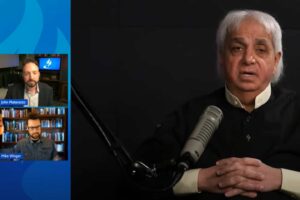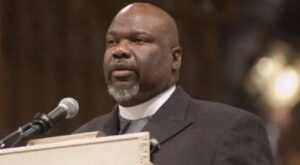Having a biblical view of Jesus during this Christmas season is essential. Unfortunately, many people in Christianity have erroneous concepts: Some think He was a created being, some think He was just a good teacher, some think He was fully divine and not human and some believe He was fully human and not God.
Jesus asked the disciples, “Who do men say that I, the Son of Man, am?” (Matt. 16:13b, NKJV). It was important to Him that men correctly understood who He was. To know precisely meant a blessing, and not to know indicated you could not be blessed by Father God.
The great doctors of the early church who fought erroneous views regarding Jesus made the correct belief that knowing who Christ was of primary importance. The beginning of the text of the Athanasian Creed is as follows:
“Whosoever will be saved, before all things it is necessary that he hold the Catholic faith. Which faith unless every one do keep whole and undefiled, without doubt he shall perish everlastingly. And the Catholic faith is this: that we worship one God in Trinity, and Trinity in Unity; neither confounding the Persons, nor dividing the Essence.”
Also, the first three post-apostolic ecumenical councils aimed to grant believers the proper views regarding Jesus so they could be distinguished from heretical beliefs.
(By heresy, we refer to a belief or opinion profoundly at odds with established doctrine, especially in a religious context, leading to denial of orthodox tenets. Regarding this, Jude 3b admonishes us to “contend earnestly for the faith which was once for all delivered to the saints.”)
1. Nicene Creed (A.D. 325): Formulated at the First Council of Nicaea, this creed was designed to establish an explicit doctrine of the nature of Christ in response to Arianism. It affirmed the full divinity of Jesus, stating that He is “of the same substance” (homoousios) as the Father. This creed was pivotal in defining the orthodox understanding of the Trinity and Christ’s divine nature.
2. Constantinopolitan Creed (A.D. 381): Expanded at the First Council of Constantinople, this creed refined the Nicene Creed. It further clarified the nature of the Holy Spirit, affirming His divinity and co-equal status with the Father and the Son within the Holy Trinity. It also addressed various heretical views that emerged after Nicaea, strengthening the church’s stance on the Trinity and the full divinity and humanity of Jesus.
3. Chalcedonian Creed (A.D. 451): Formed at the Council of Chalcedon, this creed addressed the controversies of Nestorianism and Monophysitism. It defined Christ as having two distinct natures, divine and human, united in one person “without confusion, without change, without division, without separation.” This creed aimed to balance the understanding of Jesus’ dual nature, emphasizing that neither nature was diminished by the other.
Consequently, Christians should know these councils since history repeats itself, and many of the same heresies are popping up again in the modern-day church.
10 Heretical Views Regarding Jesus
1. Arianism: Arianism, named after Arius, a priest in Alexandria, held that Jesus Christ was created by the Father and thus was not co-eternal or of the same substance as God. This belief challenged the concept of the Holy Trinity by asserting that Jesus was subordinate to God the Father. (Today’s Jehovah’s Witnesses, under the name “Watchtower,” are a modern-day version of this heretical view.)
2. Docetism: Docetism, from the Greek dokein, meaning “to seem,” claimed that Jesus only seemed to have a human body and suffer on the cross. This view denied the true humanity of Jesus, suggesting that His physical form and sufferings were mere illusions (a form of Gnosticism).
3. Gnosticism: Gnosticism was a diverse set of beliefs; some posited that Jesus was a divine being who came to impart secret knowledge (gnosis) necessary for salvation. This belief often denied the humanity of Jesus, viewing the material world as inherently evil or imaginary.
Sign up NOW for a FREE Charisma Magazine Online 30-day trial!
4. Nestorianism: Nestorianism, associated with Nestorius, Archbishop of Constantinople, emphasized the disunion between the human and divine natures of Jesus Christ. It suggested that there were two separate persons in Jesus, one divine and one human, rather than two natures united in one person.
5. Monophysitism: Monophysitism, from the Greek monos (single) and physic (nature), held that Jesus had only one divine nature rather than both divine and human natures. This belief was a reaction against Nestorianism and was seen as undermining the full humanity of Jesus. In this view, the divinity of Christ totally subsumed the human aspect of Jesus, thus diminishing the incarnation.
6. Marcionism: Founded by Marcion of Sinope, this belief system rejected the Old Testament and viewed the God of the Hebrew Bible as inferior to that of the New Testament. Marcionism posited that Jesus was the son of the New Testament God, entirely distinct from the Yahweh of the Old Testament and contemporary times. Christians who neglect the Old Testament because they think the New Testament reveals the love of God better than the First Testament have an adopted form of Marcionism.
7. Adoptionism: Adoptionism was the belief that Jesus was born as a mere man and was adopted as the Son of God at His baptism, resurrection or ascension. This view contradicted the orthodox belief in the preexistence of Christ and His divine nature from birth.
8. Apollinarianism: Proposed by Apollinaris of Laodicea, this doctrine held that Jesus had a human body and a human sensitive soul, but not a human rational mind, which was replaced by the divine logos or word. This view denied the full humanity of Jesus by asserting that His divine nature took the place of what would be the human mind, thus making Him less than fully human.
9. Ebionitism: Ebionites were a Jewish Christian sect that viewed Jesus as a mere human and a prophet, but not divine. They rejected the concept of the virgin birth and insisted on the necessity of following Jewish law and rites. They saw Jesus as an inspired human messenger but not as God incarnate.
10. Patripassianism: Also known as Modalistic Monarchianism, this belief, held by figures like Sabellius, proposed that the Father, Son and Holy Spirit are not distinct persons within the godhead but somewhat different modes or aspects of God. Patripassianism suggested that the Father suffered on the cross as Jesus, thus denying the personal distinctions within the Trinity. The modern-day “Jesus only” expressions of Pentecostalism are a contemporary version of this view. {eoa}
Join Charisma Magazine Online to follow everything the Holy Spirit is doing around the world!
See an error in this article?
To contact us or to submit an article




















